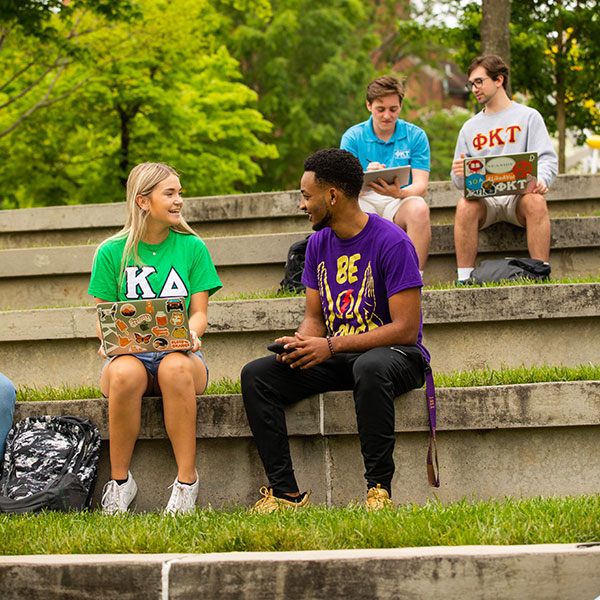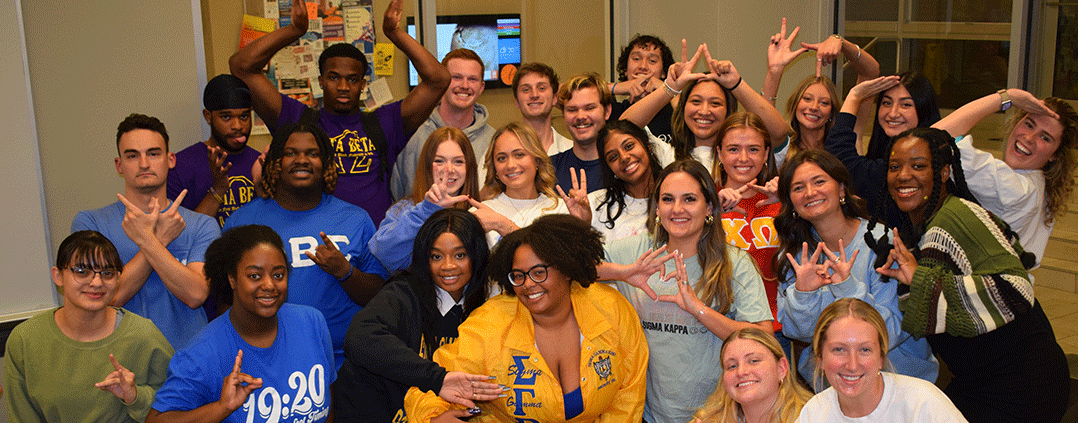Melissa Richter
For more than 150 years, sororities and fraternities have helped shape the campus culture of the University of Tennessee, Knoxville. But within these communities lies a rich and often untold story of how the Greek community grew over time into four separate and unique councils: Interfraternity Council (IFC), the Panhellenic Council, the National Pan-Hellenic Council (NPHC), and the Multicultural Greek Council (MGC). Much like a beautiful tapestry needs fabrics of multiple colors and cuts, these councils represent different histories and identities—born from the need to create spaces of belonging—but together, they form one thriving and united community.
Since 2014, the Office of Sorority and Fraternity Life has been fostering deeper relationships between these councils through two innovative programs: the Cross Council Exchange and Meeting in the Middle. These initiatives have become cornerstones of collaboration, showcasing the transformative power of shared understanding and collective action.
The Cross Council Exchange was established as a one-day event to bring together representatives from all four councils. Held once each semester, this exchange focuses on building connections and fostering a stronger sense of unity within the Greek community. Through fascinating activities and discussions, participants engage in self-exploration, gain appreciation for others’ experiences, and learn how their organizations can make a combined impact on campus.
“Cross Council Exchange is an opportunity to dip your toe in the water,” said a participant. “It’s a fun and impactful event that gives us the chance to ask important questions: Why do our organizations exist? How can we work together to create a better campus community?”
For many, the Cross Council Exchange is the first step toward building bridges across councils. It’s also a celebration of the differences within Greek life at UT, where each organization’s unique history is recognized and valued. From IFC’s long-standing traditions to the culturally rich MGC and NPHC organizations, and the legacy of empowerment upheld by Panhellenic, the exchange highlights the common threads that connect them all.
While Cross Council Exchange lays the groundwork, Meeting in the Middle takes it a step further. Hosted each fall, Meeting in the Middle selects members from all four councils to participate in five sessions focused on leadership competencies such as organizational behavior, power dynamics, group development, and creating change. These thoughtful conversations foster meaningful relationships and encourage participants to see their shared challenges and strengths.
One participant reflected, “Meeting in the Middle showed me how other councils experience similar issues. It’s been inspiring to see our differences and similarities and how we can work together to create a more welcoming community.”
 The program culminates in actionable outcomes. Participants report increased appreciation for cultural identities, greater motivation to support one another’s events, and a commitment to supporting the success of their organizations. As one student explained, “Power dynamics can create divisions, but by understanding these challenges, we’ve been able to come together as one community to support each other.”
The program culminates in actionable outcomes. Participants report increased appreciation for cultural identities, greater motivation to support one another’s events, and a commitment to supporting the success of their organizations. As one student explained, “Power dynamics can create divisions, but by understanding these challenges, we’ve been able to come together as one community to support each other.”
Perhaps the most tangible demonstration of collaboration is in service. All four councils participate in initiatives like supporting the Ronald McDonald House, where members work side by side to make a meaningful impact. In 2024 alone, UT’s Greek community served over 103,000 hours and donated more than $1 million to philanthropic causes. These efforts exemplify how unity magnifies impact—creating ripples of positivity that extend far beyond campus.
Programs like these remind students that their differences are really their strengths. By choosing to support and understand one another, the UT sorority and fraternity life community is not only creating opportunities for students to learn, lead, and serve, but also setting an example for the entire campus.
“When we come together, our efforts create a larger impact,” said a participant. “It’s about more than just our councils or chapters. It’s about creating a culture where everyone feels seen, recognized, and heard.”
As UT’s Greek community continues to grow—with a 12.4% increase in membership in 2024—programs like the Cross Council Exchange and Meeting in the Middle ensure that this growth is rooted in understanding, respect, and collaboration. Each council, chapter, and member brings a unique perspective that enriches the community as a whole. Together, they are proving that by finding common ground, we can create a campus culture that inspires and uplifts us all.
What are students saying about Meeting in the Middle?
“I have been able to learn more about other councils and organizations and how they operate. I learned a lot about the history of these chapters as well as why there are separate councils. I think it’s important to recognize how different the councils are before we try to come together. I now have a larger appreciation for the other chapters (simply because I know more about them) and am even interested in attending more of their events in the future.”
“Participating in Meeting in the Middle has helped increase my appreciation because it showed me how other councils and organizations also experience similar issues that my chapter faces. I also feel like we’ve been able to share aspects of our chapter that make us different too and highlight our cultural identity.”
“I believe that I have been able to learn more about other councils. I feel like I have been able to engage in conversations with other people, and I really want to collaborate more. It has given me motivation to appreciate other councils and see our similarities and differences and how we all want to feel included by each other.”
“I think organizational behavior discussed at our first meeting was really the tipping point for me examining that we all struggle in some of the same areas. And we can use that struggle to become more unified as a chapter, as a council, and as a community.”
